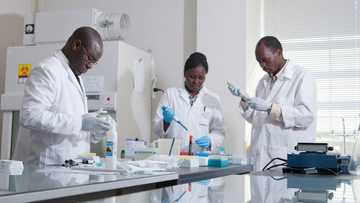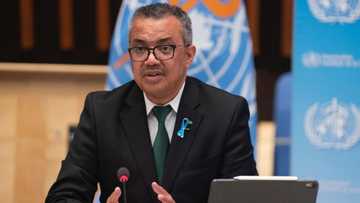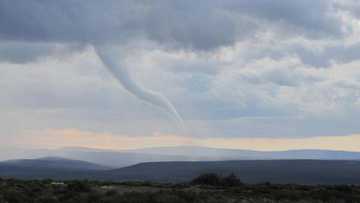Explained: What is Monkeypox and Should South Africans Be Concerned About a Possible Outbreak?
- The outbreak of monkeypox in various Western countries has many people worried about the virus reaching their countries
- The monkeypox virus has been around for many years and the first case in humans was reported in the 1970s
- Professor Shabir Madhi says South Africans do not need to panic about a possible monkeypox outbreak
PAY ATTENTION: Click “See First” under the “Following” tab to see Briefly News on your News Feed!
People across the globe have been raising concerns about monkeypox after many news reports indicated that there is an outbreak of the disease in a few countries, which include the United States of America, the United Kingdom and some European countries.
It seems as though some people have little knowledge about monkeypox which has led to some panic about the recent outbreaks.

Source: Getty Images
What is monkeypox?
Monkeypox is a virus that is closely related to diseases such as chickenpox, cowpox and smallpox and is normally transmitted from animals to human beings. The name monkeypox was first adopted in 1958 after research monkeys were found to have the disease.
PAY ATTENTION: Follow us on Instagram - get the most important news directly in your favourite app!
Scientists believe African rodents are responsible for the transmission of the virus and monkeys are not considered to be major carriers of the disease or responsible for the transmission of the virus to humans.
The monkeypox virus belongs to a subset of the Poxviridae family of viruses called Orthopoxvirus, according to News24.
Monkeypox is not a new disease despite what some people may think and the first case was first recorded in 1970 in the Democratic Republic of Congo(DRC) after a small child was isolated under the suspicion that he had smallpox.
What are the signs and symptoms of monkeypox?
The Center for Disease Control and Prevention (CDC) indicates that monkeypox has similar but milder symptoms than smallpox. These symptoms usually start off with a fever, headaches, muscle aches and fatigue or exhaustion. Monkeypox also results in swollen lymph nodes while smallpox doesn't.
As the disease progresses, a rash starts to appear on the person who has been infected, usually starting on the face before spreading to the entire body. This rash can start to appear between 1-3 days after the fever starts, however, sometimes the rash takes longer to appear.
How long does it take to recover from monkeypox and can it cause death?
The CDC says the incubation period (the time from infection to symptoms appearing) of monkeypox can be between 7-14 days and in some cases between 5-21 days. The disease itself can last between 2-4 weeks.
In cases reported in African countries, monkeypox seems to have caused deaths in 1 out of 10 people.
Should South Africans be concerned about Monkeypox?
Professor Shabir Madhi, Professor of Vaccinology at the University of the Witwatersrand explains that the monkeypox virus does not transmit the same as Covid19 and there should be little panic about it, reports EWN.
Madhi says even if cases do appear in South Africa, there will be very few cases of monkeypox. This is mainly because monkeypox is not easily transmissible like other viruses.
When it comes to human-to-human transmission, monkeypox is transmitted by close contact with someone who is infected through either touching the infected person's lesions are transmissions of fluids.
Madhi also says public health officials cannot do much to prepare for monkeypox coming to South Africa and the disease is something that you deal with once it's here.
However, Microbiologist Anza Thiba says for as long there is international travel and trade, it is highly likely that monkeypox could reach South Africa.
Speaking to Briefly News Thiba says although the virus does not spread like Covid19 it should be treated in the same manner and we should continue following regulations such as social distancing, using effective sanitisers with 70% alcohol and washing our hands regularly.
Thiba adds that on the bright side South Africa has been able to handle diseases such as smallpox and chickenpox which means the country would be able to handle outbreaks. The existence of a vaccine for monkeypox also means that the virus will be manageable.
No, you can’t get typhoid fever from drinking municipal tap water in South Africa
In more health news, Briefly News previously reported that a number of social media posts have made the claim that the recent rise in typhoid fever cases in South Africa has been linked to contaminated municipal water.
Cases of typhoid fever have been detected in a few provinces so far, namely, the Western Cape, North West and Gauteng in small clusters.
The rumours about contaminated tap water have since caused confusion on social media with a lot of people now urging each other to not drink tap water because of the typhoid fever outbreak.
Source: Briefly News




